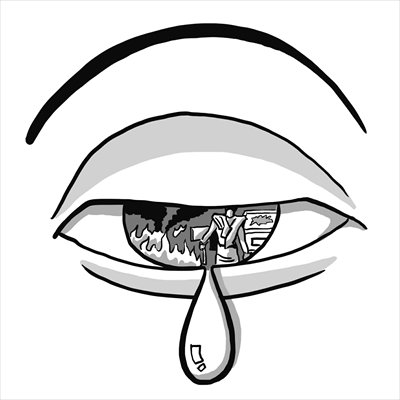HOME >> OP-ED
Monk politics a potential risk for Myanmar
By Ding Gang Source:Global Times Published: 2013-12-4 18:48:01

Illustration: Liu Rui/GT
The Chinese embassy in Myanmar recently witnessed a protest over the ongoing Monywa Copper Mine project at its doorstep. From the photos spread online, monks were detected once again among the protesters, waving fists and shouting slogans. Their continuous presence in these protests signals a risk to this nation in transition.
It has been reported that the Monywa Copper Mine is jointly managed by the military-owned Union of Myanmar Economic Holdings Ltd (UMEHL), which is under the auspices of Myanmar's Ministry of Mines, and China's Wanbao Copper Company.
According to the issued agreement, the Myanmar government will draw 51 percent of its profit, and UMEHL and Wanbao will share the remaining 49 percent. Moreover, it has been decided that the mine will spare 2 percent of its net profit as an investment to improve society.
This copper mine is clearly a cooperative project between China and Myanmar on the basis of mutual benefit. Issues concerning relocation and compensation, environmental protection and profit allocation are also dealt with fairly and squarely according to Myanmar's laws.
However, this win-win project has become a thorn in the side of some local residents. One year ago, a protest around the copper mine was launched by some local villagers, during which some monks got burnt by smoke shells pitched by the police who were keeping order.
By igniting conflicts, these local villagers want to get more compensation due to the relocation. The participation of monks, some of whom have become the backbone of such protests, is said to be related to a temple, which has to be relocated because of the project. This temple is claimed to be a cultural relic where an ancient master transcribed Buddhist scriptures.
However, according to the local historical records, this "cultural relic" hypothesis is groundless. This temple is simply a memorial for a great master after he passed away.
In order to better relocate these monks, the Chinese company involved in this project has built a new temple outside the mining area, and some monks have already started to move in. The Myanmar side has also acquired more accurate historical information about the original temple.
While more facts are being revealed, the political purposes hidden behind the monks' opposition are being uncovered. Deifying this insignificant temple and objecting to the project are only means, and their ultimate purpose is to challenge the Myanmar government and military.
Historically speaking, Myanmar monks have always been eager to get involved in political affairs. At the every critical moment of Myanmar, they have been at the forefront of political movements and drastic social changes, which have resulted in them being labeled as opposition to the Myanmar government and military.
In 2007, Myanmar's monk groups launched and led the Saffron Revolution to impose an intense opposition to the military government. This campaign was put down, but the anti-government and anti-military philosophy has extended to today.
Given the fact that the Myanmar government has just initiated political reform, looser control of the social environment will unleash more opposing voices.
In this Buddhist country, monks enjoy a high social status. But their sense of xenophobia is also strong, especially in face of the Muslims which account for less than 10 percent of the total population.
Myanmar has witnessed several instances of bloodshed in recent years. The conflict between monks and the Islamist Rohingya people in Rakhine State last year caused hundreds of deaths and left tens of thousands of Rohingya people homeless.
This March, Myanmar's central city Meiktila also saw a violent confrontation between monks and Muslims. Raging monks set fire to five mosques and several Islamist communities.
The political intervention of monks in Myanmar has significantly worsened the country's investment environment. The Monywa Copper Mine, unfortunately, is becoming a card in their hands to confront the Myanmar government and military.
This tendency casts grave shadows on Chinese companies and other foreign investments.
Economic losses can be calculated, but if this religious extremism was given free rein, the disastrous consequences to Myanmar society would be incalculable.
The author is a senior editor with the People's Daily. He is now stationed in Brazil. dinggang@globaltimes.com.cn. Follow him on Twitter at @dinggangchina